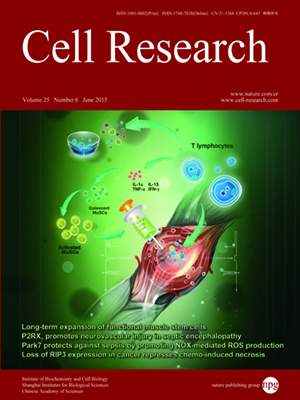
Volume 25, No 6, Jun 2015
ISSN: 1001-0602
EISSN: 1748-7838 2018
impact factor 17.848*
(Clarivate Analytics, 2019)
Volume 25 Issue 6, June 2015: 655-673 | Open Access
ORIGINAL ARTICLES
Combination of inflammation-related cytokines promotes long-term muscle stem cell expansion
Xin Fu1,*, Jun Xiao2,*, Yuning Wei3, Sheng Li1, Yan Liu1, Jie Yin1, Kun Sun4, Hao Sun4, Huating Wang5, Zongkang Zhang6, Bao-Ting Zhang6, Chun Sheng7, Hongyan Wang2 and Ping Hu1
1State Key Laboratory of Cell Biology, Institute of Biochemistry and Cell Biology, Shanghai Institutes for Biological Sciences, Chinese Academy of Sciences, 320 Yueyang Road, Shanghai 200031, China
2Key Laboratory of Systems Biology, Innovation Center for Cell Signaling Network, Institute of Biochemistry and Cell Biology, Shanghai Institutes for Biological Sciences, Chinese Academy of Sciences, Shanghai 200031, China
3CAS Key Laboratory of Computational Biology, CAS-MPG Partner Institute for Computational Biology, 320 Yueyang Road, Shanghai 200031, China
4Department of Chemical Pathology, Li Ka Shing Institute of Health Sciences, The Chinese University of Hong Kong, Hong Kong SAR, China
5Department of Orthopaedics and Traumatology, Li Ka Shing Institute of Health Sciences, The Chinese University of Hong Kong, Hong Kong SAR, China
6School of Chinese Medicine, The Chinese University of Hong Kong, Hong Kong SAR, China
7Shanghai Normal University, Guilin Road, Shanghai 200234, China
Correspondence: Ping Hu ; Hongyan Wang(hup@sibcb.ac.cn ; hongyanwang@sibcb.ac.cn)
Muscle stem cells (MuSCs, satellite cells) are the major contributor to muscle regeneration. Like most adult stem cells, long-term expansion of MuSCs in vitro is difficult. The in vivo muscle regeneration abilities of MuSCs are quickly lost after culturing in vitro, which prevents the potential applications of MuSCs in cell-based therapies. Here, we establish a system to serially expand MuSCs in vitro for over 20 passages by mimicking the endogenous microenvironment. We identified that the combination of four pro-inflammatory cytokines, IL-1α, IL-13, TNF-α, and IFN-γ, secreted by T cells was able to stimulate MuSC proliferation in vivo upon injury and promote serial expansion of MuSCs in vitro. The expanded MuSCs can replenish the endogenous stem cell pool and are capable of repairing multiple rounds of muscle injuries in vivo after a single transplantation. The establishment of the in vitro system provides us a powerful method to expand functional MuSCs to repair muscle injuries.
10.1038/cr.2015.58
FULL TEXT | PDF
Browse 2485


